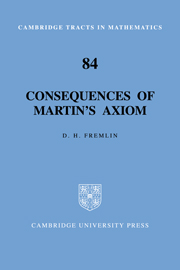Summary
This chapter is devoted to results which involve the cardinal p. The definition of p in terms of families of subsets of N makes it plain that we must expect to be limited to contexts in which countable sets play a dominant role. Thus in Theorem 21A, the underlying set X must be countable; in §§22–23, we deal mainly with second-countable spaces; in §24, we have separable spaces; and in §25 we work with spaces which have associated second-countable topologies. It is, however, worth noting that several of the arguments can reach surprisingly far. Thus 21G can apply to arbitrary subsets of c2 and 24K does not mention any restriction on cardinality, though of course such a restriction is present.
Combinatorics
The axiom p = c is, of course, a tool for finding (or, rather, an excuse for declaring the existence of) subsets of N; and it is natural to give priority to its set-theoretic consequences, even though the distinction between these and its topological consequences is not always sharp. I begin with a portmanteau theorem [21A] which embodies most of the straight forward ways of using the principle P(k) itself. I use this to prove first that 2K ≤ c for K < p [21C] and then to give conditions sufficient to make every subset of X × Y attainable in two steps from sequences of ‘rectangles’ [21G]. I conclude with remarks on four further topics: a lemma in the partition calculus [211], R.B. Jensen's principle ♦ [21J], the possible values of p [21K] and Hausdorff's gap [21L].
- Type
- Chapter
- Information
- Consequences of Martin's Axiom , pp. 30 - 110Publisher: Cambridge University PressPrint publication year: 1984



